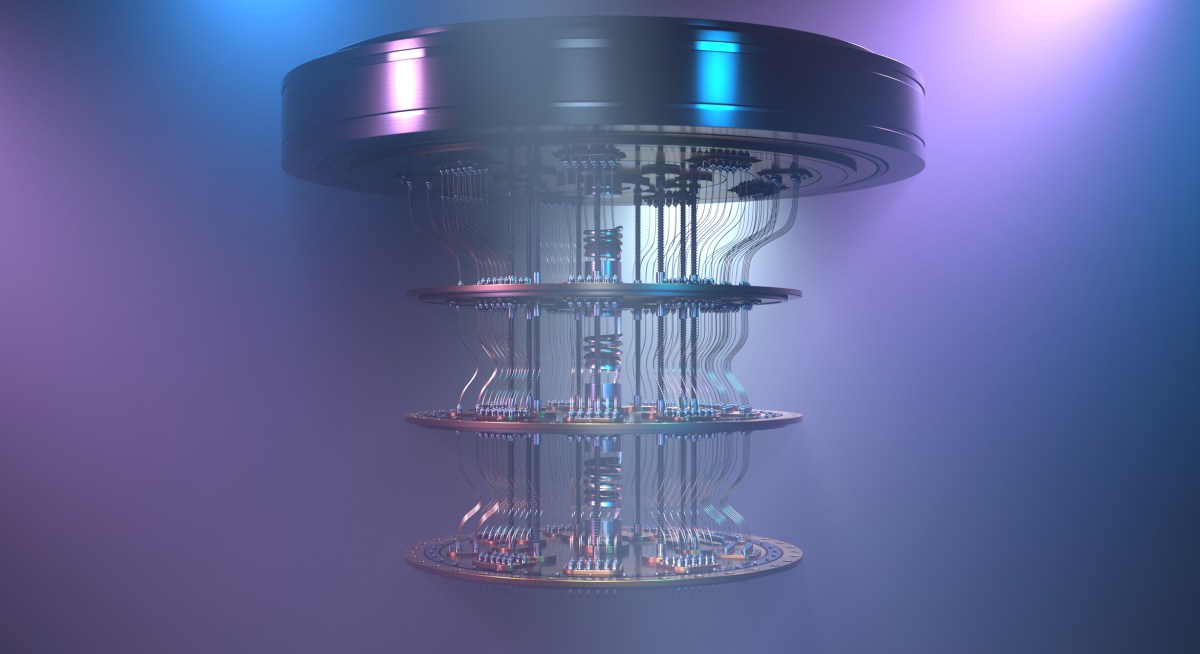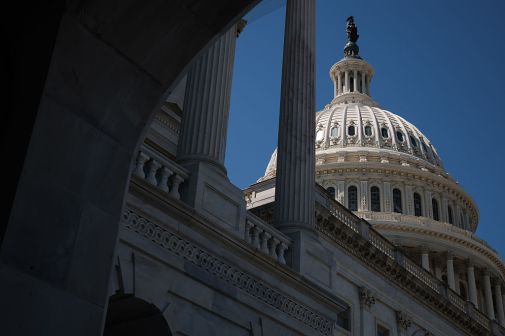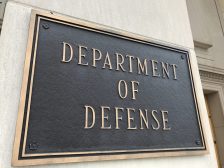Experts give 2024 NDAA positive marks on quantum provisions

The fiscal 2024 National Defense Authorization Act includes multiple provisions that will push the Pentagon to use in-the-making and likely disruptive quantum computing capabilities to support emerging U.S. national security missions.
Broadly, quantum information science (QIS) and related technologies encompass the investigation and application of complex phenomena happening at atomic and subatomic levels to process and transmit data and information. Scientists and experts expect the still-evolving field will enable transformational science, engineering and communication assets as early as this decade — particularly for the Department of Defense.
DefenseScoop recently asked Pentagon observers with quantum expertise to weigh in on the significance of the QIS inclusions that did (and did not) make it into the 2024 NDAA.
“Would we have liked to have seen more? Of course — a bigger overall quantum budget with more quantum computing purchases to increase DOD’s exposure to the technology and send a stronger demand signal would have been great,” Paul Stimers, an attorney and member of Holland & Knight’s Public Policy and Regulation Group who also leads a coalition of quantum computing, communications and cryptography companies working to advance U.S. leadership in the space, told DefenseScoop.
“But this is a very good next step and we understand the tremendous budgetary pressures on the NDAA this year (two wars, inflation/interest rates, recruiting challenges, shipbuilding, etc. etc. etc.),” Stimers added in an interview over email.
According to a fact sheet from the Senate Armed Services Committee, Congress’ bipartisan, bicameral agreement on the defense policy bill “authorizes increased funding for a number of initiatives, including a distributed quantum networking testbed, [and the] development of a next-generation ion trap quantum computer at the Air Force Research Laboratory.”
“The quantum networking testbed is a relatively small investment that will help prove out quantum networking, an area where China has led,” Stimers noted.
The more than 1,700-page legislative text also approves a provision that requires the Pentagon to set up a new pilot program geared specifically toward quantum computing capabilities that hold a lot of promise to be developed and deployed in the next two years or less.
“The quantum pilot program will provide a dedicated focus on use case identification for near-term application development, something not included in any other NDAA,” Allison Schwartz, global government relations leader at quantum computing systems producer D-Wave, told DefenseScoop.
The company and its customers have a “long history working with the DOD on quantum applications” and hardware, she confirmed.
In Schwartz’s view, the newly directed quantum pilot program will push the Pentagon to expand “its historically narrow focus beyond gate-model quantum computing and consider all viable quantum computing systems, including annealing quantum computing and quantum-hybrid applications” when developing demonstrations, proof of concepts, and pilots.
While “gate-model” and “annealing” refer to different types of quantum computer designs, “quantum-hybrid applications” essentially combine quantum and classical computing systems.
“The U.S. government must consider all quantum technologies to meet the needs of the military, including logistics and transportation challenges, optimizing autonomous and robotic vehicles, tracking space debris, and emergency response. This program will help accelerate use of near-term quantum technologies by the U.S. government which is important because other global leaders are already building applications that benefit defense and national security such as the Australian Army for emergency response re-supply, and tsunami evacuation routes in Japan. In the private sector, examples include the SavantX application for optimizing a cargo pier at Port of Los Angeles and Davidson Technologies for threat detection,” Schwartz told DefenseScoop.
Down the line, this new pilot may require additional funding via defense appropriations processes.
“The pilot program will be directed through [a federally funded research-and-development center], and should incorporate small companies and non-traditional government contractors, as much of the advancement in quantum application development is coming from those entities,” Schwartz said.
“Now we must ensure the DOD begins the important process of identifying problems that could benefit from today’s quantum computing. D-Wave and the rest of the quantum industry stand ready to partner with the DOD by helping to identify and prioritize the best use cases for today’s quantum technology, so we may accelerate the benefits to help achieve mission objectives,” she added.
In a letter to the chairs and ranking members of the congressional armed services committees, the Quantum Industry Coalition — led by Stimers — noted the need for the type of pilot program that was included in the NDAA.
“A focus on near-term applications will help avoid the natural tendency toward long-term and theoretical research,” Stimers told DefenseScoop.
The group’s letter also spotlighted the coalition’s backing of other quantum topics for the policy bill, including but not limited to: support for developing the quantum workforce; quantum computer acquisition; development and deployment of post-quantum cryptography; and investment in a distributed quantum networking testbed.
“Workforce development is a critical factor for the quantum industry across the board. It’s important that DOD begins acquiring quantum computers both to send a demand signal to the private sector (unlocking further private investment and leveraging taxpayer funding) and to enable experimentation and use-case development within DOD. Post-quantum cryptography is an immediate need, as adversaries are currently stealing encrypted data for future decryption by quantum computers,” Stimers explained.
Overall though, he said the coalition is pleased with the provisions that made it into the NDAA.
“We appreciate that Congress is helping ensure that DOD invests in potentially game-changing quantum technologies that will help us win, and thus not have to fight, the next war,” Stimers said.






